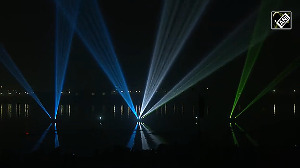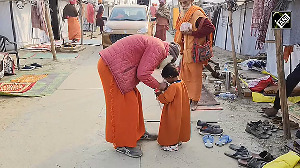The World Trade Organisations's apex decision making body -- the General Council -- is scheduled to meet this week to put the stalled trade talks back on track by electing a new chairperson and heads of negotiating groups.
The multilateral trade body will also discuss the US proposal for holding a ministerial meeting towards the end of the year.
The two-day meeting, which starts on Wednesday, is being seen as the first concrete step since trade liberalisation talks failed in Cancun in September last year.
Japanese envoy to WTO Shotaro Oshima is the front-runner in the race for the new General Council chairman in place of Uruguay's Perez Del Castillo.
While the US is agreeable to Oshima's candidature, some developing countries are still not convinced about the Japanese trade envoy's support in pushing their case.
A decision is expected on Monday when WTO chief Supachai Panitchpakdi finalises the list of negotiating group heads as well. US Trade Representative Robert Zoellick, in a letter to trade ministers from WTO member countries, had proposed that the framework for negotiations be fixed by the middle of the year and the sixth ministerial meeting, slated to be held in Hong Kong, be organised by the end of the year.
The US delegation to the WTO wanted to place the issue on the General Council agenda.
According to the agenda circulated to WTO members, Iran's accession to the Geneva-based body and Iraq's request for observer status will also be considered.
Besides, India, US, Brazil and 26 other countries have also sought that the implementation of Harmonised System 2002 classification in their respective schedules be deferred by a year to December 31, 2004.
Indian officials said the week could provide an indication of things to come during the course of the year, though it might be difficult to stick to the December 2004 deadline for the completion of the Doha round of trade talks.
The European Union is slated to hold consultations with the coalition of developing countries on agriculture on February 12 and 13, and other informal meetings are lined up over the next few days.
"Negotiating group meetings are being worked out, informal contacts are scheduled to take place but how much of this will translate into negotiations will depend on the flexibility people are willing to show. At the moment people are only talking about their intent," an official said.
India wants the framework for negotiations in all areas to reflect the Doha mandate and also ensure that it is not constrained in future negotiations.
It has also said the framework should be "clear and unambiguous" to avoid any confusion during the course of the negotiations and wants numbers should be reflected in the modalities.






 © 2025
© 2025